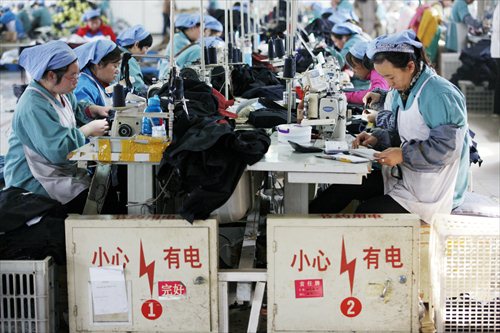HOME >> BUSINESS
Slowing economy ‘biggest challenge’
Source:Global Times Published: 2016-3-2 23:03:02
Head of EU body says ‘Belt and Road’ initiative needs fresh success story

Employees work at a clothing factory that exports clothing to the European Union in Huaibei, East China's Anhui Province. File photo: IC

Joerg Wuttke, president of the European Union Chamber of Commerce in China Photo: Courtesy of the European Union Chamber of Commerce in China
Editor's Note:
Overcapacity has been one of the most talked-about topics in the Chinese media since the end of 2015. In February, the European Union Chamber of Commerce in China published a report on the issue. Joerg Wuttke, president of the European Union Chamber of Commerce in China, sat down in an exclusive interview to share his insights with the Global Times on a number of issues such as China's market economy status, market access, investment restrictions, and the One Belt and One Road initiative.
GT: The EU was China's biggest trading partner in 2015. What is blocking the further deepening of the bilateral economic relationship?
Joerg Wuttke: The No.1 challenge is the slowing down of the Chinese economy. That means fewer opportunities to sell. Then there are debt burdens and overcapacity. Frankly, we are all spoiled. We have seen 20 years of 10 percent growth and have benefited a lot.
The second is the regulatory environment. There will be more European businesses in China if this issue can be tackled.
Another issue blocking the relationship is possible protectionism in Europe.
It is very interesting to see so many Chinese investment deals have gone through in Europe, while so many were blocked in the US.
On the other hand, European firms don't even look into investment in China in some areas because it is not possible.
So it is a lopsided situation. China can buy an electric grid in Portugal, buy ports in Greece, an airport in Germany - but European businesses in China don't even consider doing this in China.
We thank China for putting money into Europe and maintaining jobs. But an investment agreement between China and Europe is taking place and it could tackle many of the problems.
GT: What causes trade disputes between China and the EU?
Joerg Wuttke: People worry about jobs. The Chinese government is concerned about the safety and well-being of the Chinese economy and European regulators are concerned about the safety and well-being of the EU economy. Anti-dumping is a legitimate tool that is accepted by the WTO. Disputes can be settled in Geneva. It is a legitimate defense mechanism if an economy feels threatened.
Recently, China won a case against Europe on metal fasteners, so it is not shy of using anti-dumping charges itself. Every region has legitimate reasons to have manufacturing. It means jobs and a supply chain in the region.
GT: Will more sectors be engulfed in trade disputes?
Joerg Wuttke: Everything related with steel. Products out of steel. Trade tensions arise normally from three sectors: steel, chemicals and paper. The three areas comprise 80 percent to 90 percent of all anti-dumping cases.
GT: What is the defining economic event of 2015 between China and Europe?
Joerg Wuttke: There were two. First, the takeover of Pirelli by ChemChina. It shows that China invests far more in Europe than Europe invests in China. Pirelli is a big name, it changes hands and there are no objections. It shows that Europe is open.
Going into 2016, the same company buys Syngenta, one of the world's best companies in biotechnology. Looking at 2016, what progress is made in the investment agreements between China and the EU will be important. And I will watch if China will continue to invest in Europe, like the Syngenta deal. And how much openness will there be in China in opening up for European companies.
GT: Will China be recognized as a market economy in 2016?
Joerg Wuttke: There seems a legal obligation to grant China market economy status in 2016. But at the end of the day, it will be determined by the European parliament. And there are also political implications. Unfortunately, exactly in the year in which China is expecting such a status we have demonstration of steel workers on the streets of Brussels. The impact is negative for China as it has promised export controls.
Hence our politicians look for solutions that might grant conditional recognition of China's market economy status. Before a final decision is made, anything can happen. It doesn't make any difference if I wish for China being granted such a status. What I really wish for China is that it becomes a market economy, as anticipated by the 2001 administration of Premier Zhu Rongji, who actually thought 15 years later China will be a market economy.
GT: China's "Belt and Road" initiative has been welcomed by most of its neighbors and trading partners. What needs to be done to ensure it is a success?
Joerg Wuttke: The initiative needs a success story to sell around the world. It needs a clear, big, genuine, new project and we call it a "lighthouse project." It allows everybody to see - "Oh! This is One Belt and One Road!" So far, we haven't seen such a project.
We need a new project somewhere along the overland and maritime Silk Road, to allow people to see how well it can be incorporated into the local economy, how it can be speeding up movement, bringing benefits and boosting connectivity. And I believe such a project will be born from one of the Asian Infrastructure Investment Bank (AIIB)-funded projects. As the AIIB has just gotten up and running, it is too early to expect such a project.
You have to be patient for big visions like this to find its feet. I like the political vision of the "Belt and Road" initiative, I like the idea to connect Asia and Europe better via it. I would hate for it to be connected with overcapacity, and I wish it a success.
GT: What about loosening export controls to address the trade imbalance between China and the EU?
Joerg Wuttke: It is legitimate to have controls on exports of sensitive items. The US has far more restrictions in this regard. And high-tech product export possibilities may be worth less than 10 percent of the total value of the trade imbalance between EU and China.
Opening up these sectors won't make a dent in addressing the trade imbalance but the technology value for the EU is too big. China still has strict restrictions on imported goods, such as food, labeling of goods, and car parts, making EU exports difficult.
Posted in: Companies